1. Portable storage at its maximum!
Plextor PX-S88TU -
Page 1
Portable storage
at its maximum!
- Introduction:
 is something that many users and manufacturers have been waiting as a solution
to the needs for a fast peripheral connection for personal computers. After
the announcement of the USB 2.0, it was certain that many manufacturers would
take advantage of the increased BUS speed, and would ship new models. TEAC was
the first company to announce an external USB 2.0 recorder back in July of 2001
with the codename CD-RW280PU. Recently Plextor also introduced the PX-S88TU
with the exact same specifications (8/8/24) as the TEAC drive. As it seems,
the race for the best USB 2.0 external writer has just begun. Which of the two
is worthy of this title? Is USB 2.0 a real solution for external recorders?
Let's find out!
is something that many users and manufacturers have been waiting as a solution
to the needs for a fast peripheral connection for personal computers. After
the announcement of the USB 2.0, it was certain that many manufacturers would
take advantage of the increased BUS speed, and would ship new models. TEAC was
the first company to announce an external USB 2.0 recorder back in July of 2001
with the codename CD-RW280PU. Recently Plextor also introduced the PX-S88TU
with the exact same specifications (8/8/24) as the TEAC drive. As it seems,
the race for the best USB 2.0 external writer has just begun. Which of the two
is worthy of this title? Is USB 2.0 a real solution for external recorders?
Let's find out!
- What is USB Hi-Speed?
USB Hi-Speed is another name for USB 2.0. The official USB Promoter
Group didn’t want the new USB 2.0 specification to be regarded as a completely
new standard, which would confuse consumers. Therefore, USB 2.0 was named as
USB Hi-Speed, and USB 1.1 got a new title as USB Basic Speed. The specification
was released on April 2000. USB 2.0 was developed because of the needs for increased
speed, much more than USB 1.1. USB 2.0 has a raw data rate at 480Mbps, and it
is rated 40 times faster than its predecessor interface, USB 1.1, which tops
at 12Mbps. With that increased speed, users can enjoy faster CD-RW drives than
4x writing, which was the limit for USB 1.1 hardware. :-)
USB 2.0 is backwards compatible, which means you can connect all
previous USB devices to the new USB 2.0 interface. The maximum length of a USB
2.0 cable is 5m, which makes it an ideal solution for external portable recorders!
- USB 2.0 hardware:
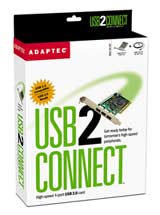 Most
current M/B only support the USB 1.1. In order to be able to test both TEAC
and Plextor USB 2.0 writers, we used Adaptec's USB2connect 3100LP PCI card.
The USB2connect 3100LP is a USB 2.0 host adapter for PCs and Macs that provides
connectivity to USB 1.1 and USB 2.0 devices. "USB 2.0" is the fastest
USB standard - capable of transferring data at up to 480Mbit/sec while maintaining
backward-compatibility with current USB 1.1 devices.
Most
current M/B only support the USB 1.1. In order to be able to test both TEAC
and Plextor USB 2.0 writers, we used Adaptec's USB2connect 3100LP PCI card.
The USB2connect 3100LP is a USB 2.0 host adapter for PCs and Macs that provides
connectivity to USB 1.1 and USB 2.0 devices. "USB 2.0" is the fastest
USB standard - capable of transferring data at up to 480Mbit/sec while maintaining
backward-compatibility with current USB 1.1 devices.
The card has three external ports and one internal port for connecting
USB 1.1/2.0 devices. The original retail package didn't include any drivers.
Of course you could install the card but it would only work with USB 1.1 devices.
Both WinME and Win2k don't support the USB 2.0 protocol. WinXP has native support.
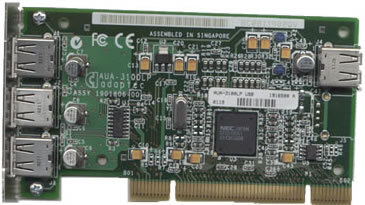 Adaptec
finally released the long awaited USB
2.0 drivers in August of 2001 and therefore we were able to start our tests.
The USB2connect also has a 10-foot (3m) USB 2.0 cable, 5 years of warranty and
costs around $65. We did notice some problems with Abit KT7 Raid M/B and with
the Adaptec's USB v1.0 drivers, blue screen :( , but it worked smoothly with
Intel based PCs. Maybe a future driver revision will correct these problems.
Adaptec
finally released the long awaited USB
2.0 drivers in August of 2001 and therefore we were able to start our tests.
The USB2connect also has a 10-foot (3m) USB 2.0 cable, 5 years of warranty and
costs around $65. We did notice some problems with Abit KT7 Raid M/B and with
the Adaptec's USB v1.0 drivers, blue screen :( , but it worked smoothly with
Intel based PCs. Maybe a future driver revision will correct these problems.
- PC Setup:
Intel P3 866@950
QDI Synactix 2EP
128MB SDRAM PC133
Adaptec 3100LP USB 2.0 card
Adaptec's USB 2.0 v1.0 drivers
WinME
TEAC CD-R/W 280PU firmware v1.1A
PleXWriter PX-S88TU firmware v1.02 #TLA 102
2. The Plextor package
Plextor PX-S88TU -
Page 2
- The package:
 We
tested the Plextor USA retail package which includes: the drive itself, 2 printed
manuals (one for the drive and one for Plextor Manager 2000), a quick reference
guide, 1 blank CD-R 74min disk (real manufacturer Taiyo Yuden), 1 Verbatim HS-RW
blank CD-R/W disk, a USB 2.0 cable, an AC (110-240V) adapter, a power cord and
an emergency stick.
We
tested the Plextor USA retail package which includes: the drive itself, 2 printed
manuals (one for the drive and one for Plextor Manager 2000), a quick reference
guide, 1 blank CD-R 74min disk (real manufacturer Taiyo Yuden), 1 Verbatim HS-RW
blank CD-R/W disk, a USB 2.0 cable, an AC (110-240V) adapter, a power cord and
an emergency stick.
The attached CDR software comes from Roxio (Ez CD Creator v5.02x/DirectCD
v5.0x) and also includes the famous Plextor Manager 2000 v1.12. The CD also
includes USB 2.0 drivers for Win98SE in case you need them. We must note that
both the drive and the Plextor Manager printed manuals are VERY well done and
you should read them before getting started with your new Plextor recorder :)
 The
Plextor PX-S88TU is packaged in a different way than the usual internal PleXWriter
series. The drive was <sandwiched> inside an airtight plastic bag, which
protects the drive from any possible damage due to bad transportation handling.
Remember that the drive is very slim and an awkward fall could possibly damage
it. So you are advised you to keep the plastic bag in a safe place for any future
need.
The
Plextor PX-S88TU is packaged in a different way than the usual internal PleXWriter
series. The drive was <sandwiched> inside an airtight plastic bag, which
protects the drive from any possible damage due to bad transportation handling.
Remember that the drive is very slim and an awkward fall could possibly damage
it. So you are advised you to keep the plastic bag in a safe place for any future
need.
The PX-S88TU ships NOW in Japan/USA and on early October in Europe
at a price of $290. Plextor
USA shop has a promotional offer for users who will buy the first PX-S88TU
batches: A free travel case for the drive specially designed to fit and protect
the drive and all its accessories. It is not clear yet if Plextor Europe will
make available similar offer. The bare drive of course is the same as with the
European version but the retail package has some important differences:
- Europe : 2 year warranty, USA : 1 year warranty
- Europe : 16-language manual
- European power cable
- Europe : on site collect and return service for defective drives
- Europe: Nero, USA: Ez CD Creator
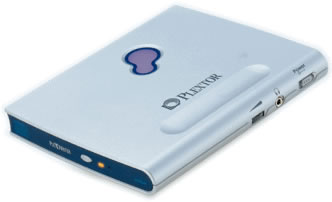 The
PlexWriter S88TU has a silver and blue casing and dimensions of 141x22x171mm
(WxHxD). It weights around 500g and is really very attractive to the user's
eye. On the top of the drive there is an open window through which you can see
if there is an inserted CD, something that is both aesthetic and practical,
since Plextor suggests that no CD should be inserted while carrying the drive.
The
PlexWriter S88TU has a silver and blue casing and dimensions of 141x22x171mm
(WxHxD). It weights around 500g and is really very attractive to the user's
eye. On the top of the drive there is an open window through which you can see
if there is an inserted CD, something that is both aesthetic and practical,
since Plextor suggests that no CD should be inserted while carrying the drive.
On the rear of the drive there is the power connector and the
USB 1.1/2.0 port. Note that the Plextor drive works only if both the USB cable
and the AC adapter are attached to the drive:

On the front you will find the eject button, a power led (power
on/disc access/writing), the loading tray, the emergency eject hole and the
"PleXWriter", "HS-RW", "BPRec" logos:

 On
the right hand side you will find the headphone jack, volume control and power
on/off switch.
On
the right hand side you will find the headphone jack, volume control and power
on/off switch.
 The
drive is based upon the internal mechanism of the PX-W88 and it supports: 2x,
4x, 8x (CLV) writing/re-writing (with USB 2.0), 2x, 4x (CLV) writing/re-writing
(with USB 1.1), 6x reading (USB 1.1) and 24x reading (USB 2.0), 2MB of buffer
and BURN-Proof. It is very interesting that the PX-S88TU also supports 8cm but
when such disks are used the reading speed is dropped to 18xCAV and record speed
at 4x.
The
drive is based upon the internal mechanism of the PX-W88 and it supports: 2x,
4x, 8x (CLV) writing/re-writing (with USB 2.0), 2x, 4x (CLV) writing/re-writing
(with USB 1.1), 6x reading (USB 1.1) and 24x reading (USB 2.0), 2MB of buffer
and BURN-Proof. It is very interesting that the PX-S88TU also supports 8cm but
when such disks are used the reading speed is dropped to 18xCAV and record speed
at 4x.
- Installation:
The drive was installed with the included USB 2.0 cable on the Adaptec 3100DLP
USB 2.0 card, at the same time in different USB 2.0 ports. After a reboot, the
system adds a warning icon in the task bar, which shows the installed USB devices.
In case you have to uninstall one device you must select it and just press stop.
Note tha tthe drive can be used with the USB 1.1 interface,
but with a lower reading/writing performance (4/4/6) than with the USB 2.0.
The PleXWriter PX-S88TU was identified as "Plextor CD-R
PX-S88T":

PleXWriter supports 8x writing, BURN-Proof, CD-Text and of course
overburn. The PleXWriter PX-S88TU was an August 2001 model with firmware revision
v1.02 installed. Note that Plextor strongly suggests that you only use the PX-S88TU
in horizontal position and not in vertical since that will cause problems to
the drive's mechanism.
3. Data Tests
Plextor PX-S88TU -
Page 3
Data Tests
Test Method:
- SCSI Mechanic v3.0x: This was used to compare the drive's
I/O performance against other various CDR-W drives (see charts). We used a pressed
CD containing PlexTools v1.08 for all tests.
- Nero CD Speed v0.84b was also used to check the drive's performance
with pressed CDs. For that test, we also used the PlexTools v1.08 pressed CD.
- SCSI Mechanic v3.0x results:
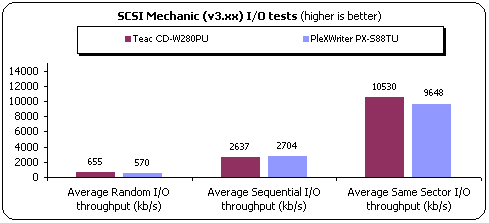
The PleXWriter PX-S88TU managed to overpass TEAC CD-RW280PU in
the "Average Sequential I/O" test. The Plextor had 2704Kb/s and the
TEAC 2637Kb/s. On the other hand the TEAC, due to its lower seek times, has
a better "Average Random I/O" mark and higher "Same Sector I/O"
performance. Both drives support up to 24x (CAV) reading speed, which is more
than enough for an external portable CD-RW drive.
- Nero CD Speed v0.84 results: (Plextor
S88TU CD Speed graphs)

Using Nero CD Speed 0.84, we confirmed the SCSI Mechanic results.
The PleXWriter PX-S88TU is faster than TEAC CD-RW280PU. It starts reading faster
and its ending speed is also higher than the TEAC. The PleXWriter PX-S88TU has
an average of 18.51X, while the TEAC CD-RW280PU has 18.01X.
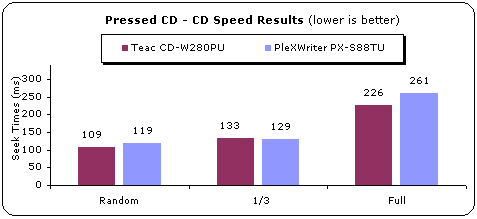
In the "Seek Times" test, the TEAC drive is faster
than the Plextor drive, as expected. TEAC models usually have the lowest seek
times, and from our tests this was confirmed once again. The random seek time
for TEAC is 109ms, while for the PleXWriter it is 119ms.
- PSX Pressed Media
For this test we used the PSX game 'NBA Jam Extreme' and we ripped the image
to HD with CloneCD. We measured the reading times for both tested drives. Plextor
is the winner here with only 122secs, while the TEAC needs 28 more seconds to
complete the image:

- CDR Media: (Plextor
S88TU CD Speed graphs)
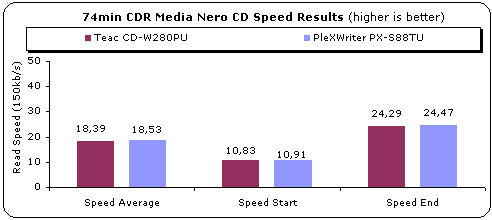
With CDR media, both drives performed better than with the pressed
test disc. The PleXWriter still holds the first place, with 18.53X and TEAC
loses with 18,39X.
4. RW reading tests
Plextor PX-S88TU -
Page 4
RW reading tests
- Nero CD Speed v0.84 Test: (Plextor
S88TU CD Speed graphs)
For the RW tests, we used TDK's HS-RW media. The TEAC CD-RW280PU
has its reading speed locked to 8x (CLV) with HS-RW media, while PleXWriter
goes from 7X-10X and is actually slower:

CloneCD Reading
Tests
- Procedure:
We used CloneCD (v3.0.8.2) and 5 original CDs - Euro 2000 (SafeDisc 1),
No One Lives For Ever (SafeDisc 2), Rally Masters (LaserLock 1), Desperados
(LaserLock 2) and V-Rally 2 Expert (SecuROM 2) - in order to test the reading
performance of the PleXWriter PX-S88TU and TEAC CD-RW280PU. We also tested its
reading performance with backups of the original CDs, since the reading speed
varies between the original and the backup media. The following pictures show
reading/writing capabilities for both drives:
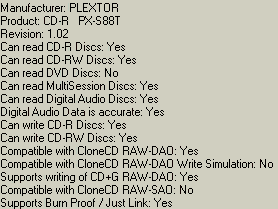
- SafeDisc 1/2 Results:
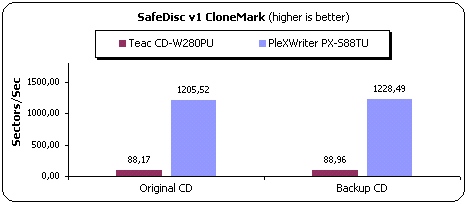
The PleXWriter PX-S88TU is a great performer with SD1 protected
CDs. The drive needs only 3.3mins to finish the task and skips errors very fast.
The TEAC CD-RW280PU skips errors very slowly and needs 48mins to end the task.

With SafeDisc v2.0 protected CDs, the PleXWriter
PX-S88TU showed a strange behaviour. With our normal test disc (NOLF), the drive
needed over one hour to make the image. The bad news was that the drive kept
reporting bad sectors than the actual ones (which ended at 10041). We made another
test with "Max Payne" original CD, and this time the drive needed
only 4mins to make the image but again reported more bad sectors than the actual
ones. With backup CD, the drive didn't show any problem. The TEAC CD-RW280PU
continues to skip error slowly and needs 45mins to end the task.
LaserLock 1/2 Results:
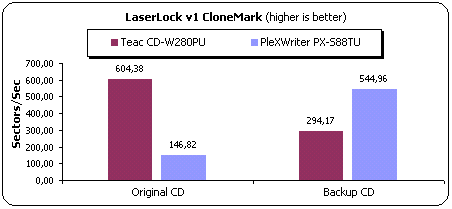
In the LaserLock protected CDs test, the TEAC CD-RW280PU is faster
than the PleXWriter, at least with the original CD. With the backup CD, the
PleXWriter outperforms the TEAC with ease. Remember that LaserLock errors are
very hard for any drive to skip.
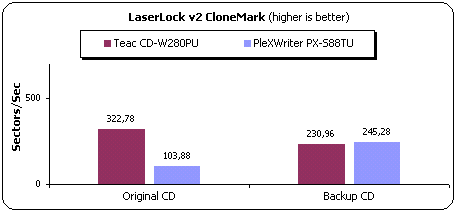
With LaserLock 2 protected CDs, the TEAC seems faster, again
with the original CD. PleXWriter gets its revenge and ends first with the backup
CD.
SecuROM Results
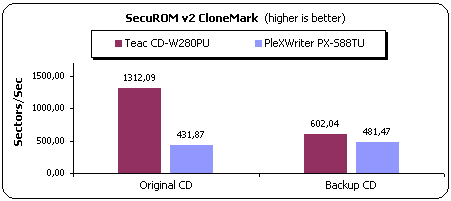
Both drives can read SubChannel Data from Data/Audio tracks without
any problems. The TEAC CD-RW280PU is a lot faster than PleXWriter with both
pressed/backup CDs.
5. DAE Tests
Plextor PX-S88TU -
Page 5
DAE Tests
Test Method:
We used CD DAE 99 v0.21 beta and EAC v0.9 prebeta 11 software in order to
check the DAE performance of both drives with various AudioCDs (both pressed
and CDR). The posted DAE results are the average of both applications, but the
CPU usage was only taken from CD DAE 99, since EAC occupies the system a lot
more. As a last note, we used the "BURST" reading mode of EAC. We
made a full CD Rip starting from the first to the last track of the CD. The
Average DAE reported speed along with the CPU Usage is displayed in the test
graphs.
- DAE features:
The PleXWriter PX-S88TU does support "Caching", "Accurate Stream"
and "C2 error info".
- Pressed AudioCD results: (Plextor
S88TU CD Speed graphs)
The PleXWriter PX-S88TU supports up to 24x (CAV) DAE with both pressed and
CDR media. On the TEAC CD-RW280PU DAE speed is locked at 8x (CLV), and therefore
it cannot really compete against the PleXWriter:
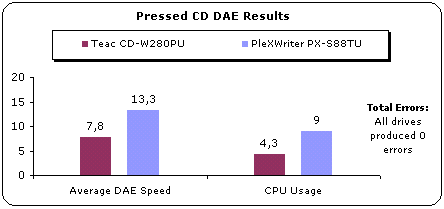
As we can see, the PleXWriter easily wins with 13.3X average
DAE speed. As we said earlier, the DAE speed of the TEAC drive is locked at
8X and stays away from the top.
- CDR AudioCD Results: (Plextor
S88TU CD Speed graphs)
Both drives performed with CDR media as with pressed CDs:

- EAC Secure Extract Ripping mode:
After many requests from numerous visitors we have added the
EAC's secure extract ripping mode results, which ensures maximum produced WAV
quality. Note that for each drive we used the build-in detection function:
|
Tested Drives |
Average DAE Speed (X) |
|
Pressed |
CDR |
|
TEAC CD-RW280PU |
7.5 |
7.6 |
|
PleXWriter PX-S88TU |
2.3 |
2.6 |
The TEAC CD-RW280PU was much faster than PleXWriter PX-S88TU,
mainly cause it doesn't "caching" data. During the DAE process EAC
reported many sync errors, however the final CRC for all tracks were ok. The
PleXWriter drive keeps it's speed under 3X, at the Secure mode.
- Advanced DAE Quality

Both drives performed excellently in the Nero CD Speed Advanced
DAE quality test. Both drives produced 0 data/sync errors and got a perfect
score (100). The PleXWriter managed to make 1:34:59 h (ouch) to finish the task
and produced lot of noise during the test:
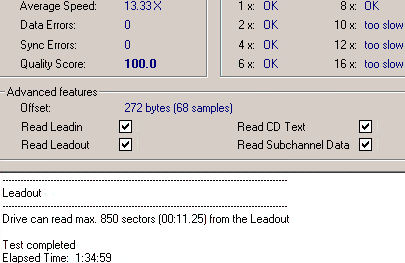
- Bad CDR Media results:
Despite the fact that Nero CD Speed Advanced DAE test stretches
a drive's mechanism to the max, we decided to do real life tests with a scratched
disc. The disc was dirty, and with some light scratches, enough to cause problems
to most of the tested drives. We used CD DAE 99 software to rip the whole disc
(756539616 sectors) and the results were very interesting:
|
|
Average Speed (X) |
Errors |
Errors Of Total Disc (%) |
|
TEAC CD-RW280PU |
7.9 |
0 |
0,00 |
|
PleXWriter PX-S88TU |
12,6 |
86458 |
0,01 |
As the tests proved, the TEAC CD-RW280PU shows a better behaviour
with scratched CDs than the PleXWriter, which managed to produce 86458 read
errors. The TEAC managed to produce zero (0) errors and gave a perfect output.
- Ripping 90 and 99min CDs:
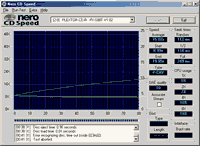

The PleXWriter PX-S88TU can read 90min CDs without any problems,
but doesn't recognize 99min CDs well.
6. CDR Tests
Plextor PX-S88TU -
Page 6
CDR Tests
Both drives support 8x (CLV) writing with USB 2.0 interface.
When connected to USB 1.1 the writing speed drops at 4x (CLV). In addition,
both drives support anti-buffer underrun technologies - TEAC supports "JustLink",
and PleXWriter "BURN-Proof". We tested both drives with Nero v5.5.2.4,
CloneCD v3.0.8.2 and Padus DJ v3.50.799 software. For the CDR tests we used:
Creation 74min (12x), Taiyo Yuden 74 & 80min (24x), Mitsui 74min (24 &
16x) and Verbatim/TDK 74min HS-RW media.
- CD-R Tests
We created a "DataCD" job with data slightly higher than 74mins
(74:03:65). We burned the same job with both drives, using the same media:

The TEAC CD-RW280PU was faster than PleXWriter PX-S88TU with all tested media.
The TEAC needs 598min to finish the task, while the PleXWriter needs 13 more
secs. It seems that PleXWriter OPC lasts longer, but as we will see it gives
better quality produced CDs, mostly with lower quality media. The CPU Usage
is very low for both recorders! No more 100% CPU Usage, when using USB 2.0 recorders.
- 80min CDs
Following the same procedure as in the previous test, we created a DataCD
with data lower than 80min (79:49:50). The TEAC drive doesn't support overburning
and we used the same media for all burns. The TEAC CD-RW280PU is faster, with
only 5secs ahead:

- Writing Quality Tests
We used low quality media written at 8x, with both drives. The results are
posted in the following table:
* Creation 74min 12x
Creation 74min - 12x - serial: 1B-11401-15:49
ATIP: 97m 27s 19f
Disc Manufacturer: Plasmon Data Systems, Ltd.
Assumed Dye type: Phthalocyanine (Type 9)
Media type: CD-Recordable
Nominal Capacity: 654.49MB (74m 30s 00f / LBA: 335100)
Disc subtype: Medium Type B, low Beta category (B-)
Target writing power: 5
|
8x writing speed
(AudioCD) |
|
Model |
C1 |
Average Burning Time (secs) |
|
Max |
Average |
|
PleXWriter PX-S88TU |
39 |
6,7 |
623 |
|
TEAC CD-RW280PU |
47 |
7,5 |
591 |
The PleXWriter produced CDs of better quality, when using low
quality media from "Creation". The drive produced 6.7, while the TEAC
has 7.5 C1 error rate. The TEAC however is 32secs faster than the PleXWriter
with the specific media.
When using high quality media (such as Taiyo Yuden 80min 24x),
both drives produced CDs of equal quality (0.2 C1 average error rate).
The following graph comes from the Creation 74min 12x media:
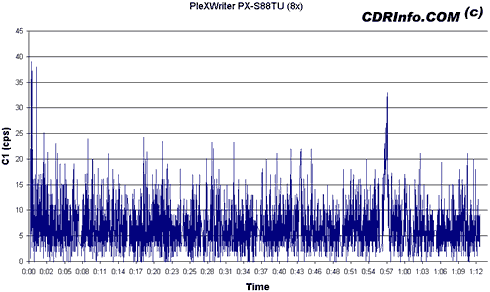
- Overburning Tests:
The TEAC CD-RW280PU doesn't support overburning and as for PleXWriter PX-S88TU
it seems to go only up to 89minutes.
- CD-Text Results:
We created several AudioCDs with CD-Text enabled. Both drives can write/read
CD-Text without any problems.
- CloneCD Tests:
CloneCD
v3.0.8.2 reports that the TEAC drive supports only SAO-RAW writing mode, while
the PleXWriter supports only RAW-DAO. CloneCD recognizes that both drives have
anti-buffer underrun protection. The TEAC supports simulation with "JustLink"
enabled, while the PleXWriter doesn't. According to our tests, TEAC can backup
only SD1, LaserLock1/2 and PleXWriter SafeDisc 1, LaserLock 1/2 and SecuROM
2 protected CDs.
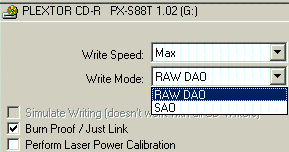
- SD2 Support:
For the SD2 tests we used the "No One Lives For Ever", "Emperor
Battle for Dune" and "Max Payne" CD titles. We used both drives
as readers/writers. The produced backups didn't play in the same or other drives.
Therefore both drives cannot produce SD2 working backups.
- 8cm mini CDs:
Both drives support 8cm CDs. We are not so sure if business cards are supported.
With 8cm CDs the PlexWriter lowers its writing speed to 4x and reading speed
down to 18x (CAV).
- Buffer Underrun tests:
Both drives support anti-buffer underrun protection. The PleXWriter PX-S88TU
has got the "BURN-Proof" certificate from the BURN-Proof center, which
ensures that the drive will produce the highest quality CDs, when BURN-Proof
is activated. The TEAC CD-RW280PU supports "JustLink" anti-buffer
underrun technology, which eliminates coasters from buffer underruns. Both drives
worked without any problems when buffer underrun was attempted from our side.
When you press ctrl+alt+del the drive will start blinking and when you un-freeze
the PC writing is resumed :-)
7. RW Writing Tests
Plextor PX-S88TU -
Page 7
RW Writing Tests
We used Nero 5.5.2.4 for writing CDs in maximum RW writing speed
(8X) with both drives in 10x HS-RW media. The TEAC leads the re-writing race:

The TEAC drive needs 598 secs to finish the task, and the PleXWriter
11more seconds. The average CPU Usage is a bit higher for the TEAC (7%). The
erase time seems low for both drives.
- Packet
Writing Tests:
We used Ahead InCD v2.26 for all Packet Writing tests. We used TDK
HS-RW media and we formatted it. The formatted disc revealed 530mbs of free
space. We copied a 403 MB file (403.147 kbs) from a Hard Disk (on the same PC
as the writers) to the formatted RW media-using explorer (we dragged and dropped)
and we completed the test twice to eliminate possible time measurement faults
and user errors:

Both TEAC and Plextor drives have the same exact writing performance
at packet writing mode. The TEAC has 5.7X and the Plextor 5.71X.
The TEAC drive seems to perform slightly better in the reading part with 5.59X,
while PleXWriter has 5.19X.
8. PleXWriter PX-S88TU Conclusion
TEAC
CD-RW280PU vs. Plextor PX-S88TU -
Page 8
PleXWriter PX-S88TU Conclusion
|
Positive (+): |
Negative (-): |
|
- Elegant design
- Supports USB 1.1/2.0 interfaces
- "BURN-Proof" anti-coaster technology
- Very good tray design
- Very good data reading performance with both CDR/pressed media
- Very good DAE speed
- Produces better quality CDs (when using low quality media)
- Supports DAO-RAW
- Supports overburning (up to 89minutes)
- Supports reading/writing of SubChannel Data
- Supports CD-Text (reading/writing)
- Low CPU Usage while operating
- Weights 500gr |
- Higher recording times than TEAC CD-RW280PU
- DAE quality is not perfect with scratched CDs
- Failed to backup SD2 protected CDs
- Loud noise when executing Nero CD Speed Advanced DAE!
- Higher price than competition ($285) |
After the end of our roundup, one thing was in our minds. How
dramatically technology changes for the sake of end users. USB 2.0 solves, at
last, the previously limited 4/4/6 CD-RW solutions and gives the users a fast
and very easy way to backup their important data. Both the tested CD-RW drives
will make their users happy, and it would be nice to see even faster portable
solutions in the future.
Even if TEAC and the PleXWriter share the same writing/re-writing/reading
speeds (8/8/24) the final results show some interesting differences. Each drive
has its own positive and negative points, which should be studied carefully
by the possible buyer. Our Japanese visitors are lucky to have the choice between
both recorders, but for the rest of the world the PleXWriter PX-S88TU is the
only way to go. Now if you keep asking for the best, that small window on the
top does make the difference ;-)